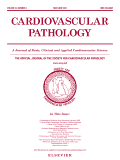
CARDIOVASCULAR PATHOLOGY
Scope & Guideline
Transforming understanding through rigorous research.
Introduction
Aims and Scopes
- Pathological Mechanisms of Cardiovascular Diseases:
The journal focuses on elucidating the cellular and molecular mechanisms underlying various cardiovascular conditions, including ischemic heart disease, myocarditis, and cardiomyopathies. - Innovative Diagnostic Techniques:
Research is dedicated to developing and validating new diagnostic methods, including histopathological assessment, molecular diagnostics, and imaging techniques. - Clinical Pathology and Case Studies:
The publication features case reports and clinical studies that provide insights into rare and complex cardiovascular conditions, enhancing the clinical knowledge base. - Translational Research:
Emphasis is placed on bridging basic research with clinical applications, particularly in understanding the implications of genetic, inflammatory, and structural changes in cardiovascular pathology. - Impact of External Factors on Cardiovascular Health:
There is a growing interest in how factors such as infections (e.g., COVID-19), environmental influences, and lifestyle choices impact cardiovascular disease processes.
Trending and Emerging
- COVID-19 Related Cardiovascular Pathology:
There is a significant rise in research addressing the cardiovascular implications of COVID-19, including myocarditis and post-viral syndromes, reflecting the pandemic's impact on cardiovascular health. - Genetic and Molecular Insights into Cardiovascular Diseases:
A growing number of studies focus on genetic profiling and molecular pathways involved in various cardiovascular conditions, emphasizing personalized medicine and targeted therapies. - Machine Learning Applications in Cardiovascular Diagnostics:
The integration of machine learning and digital pathology for improved diagnostic accuracy and patient outcomes is becoming increasingly prevalent. - Role of Inflammation in Cardiovascular Diseases:
Research highlighting the role of inflammatory processes in cardiovascular pathology, including myocarditis and vascular diseases, is gaining momentum. - Cardiac Fibrosis and Remodeling:
Emerging studies are focusing on the mechanisms and consequences of cardiac fibrosis, linking it to various cardiovascular diseases and exploring therapeutic targets.
Declining or Waning
- Traditional Histopathology Techniques:
While still important, there is a noticeable decline in papers solely focused on conventional histopathological techniques, as there is a shift towards integrating molecular and digital pathology. - Basic Cardiovascular Physiology:
Research centered around fundamental cardiovascular physiology appears to be waning, possibly due to the increasing complexity and specialization in cardiovascular pathology. - Isolated Case Reports with Limited Implications:
The trend shows fewer publications focusing on isolated case reports that do not contribute significantly to broader clinical or pathological understanding. - Aging and Cardiovascular Disease Research:
Although still relevant, studies specifically addressing age-related cardiovascular diseases have decreased, possibly due to a growing concentration on acute and emergent cardiovascular conditions. - Historical Perspectives on Cardiovascular Pathology:
Research articles that focus primarily on historical perspectives and retrospective analyses are less frequent, indicating a preference for contemporary issues and future directions in research.
Similar Journals

Fetal and Pediatric Pathology
Illuminating the path to improved child health.Fetal and Pediatric Pathology, an esteemed journal published by TAYLOR & FRANCIS INC, is dedicated to advancing the field of pediatric and fetal medicine through the dissemination of high-quality research and clinical insights. With an ISSN of 1551-3815 and an E-ISSN of 1551-3823, the journal has been a key resource for researchers and practitioners since its inception in 1983. Based in the United Kingdom, it covers a broad spectrum of topics relevant to Medicine, Pathology and Forensic Medicine, and Pediatrics, Perinatology, and Child Health, consistently reflecting on contemporary challenges faced in these fields. The journal has attained a commendable Q3 ranking within its categories as of 2023, underlining its relevance in the academic community. Though not an open-access publication, the research presented in Fetal and Pediatric Pathology plays a pivotal role in informing practice, guiding future studies, and enhancing the understanding of diseases affecting fetuses and children. Its convergence of research throughout multiple years, continuing until 2024, marks it as a crucial platform for ongoing scientific dialogue and innovation, aimed at fostering better health outcomes for younger populations.
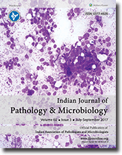
Indian Journal of Pathology and Microbiology
Connecting Researchers to Transform Medical ScienceIndian Journal of Pathology and Microbiology, published by Wolters Kluwer Medknow Publications, is a distinguished open-access journal that has been fostering knowledge dissemination in the fields of pathology and microbiology since 2008. With an ISSN of 0377-4929 and E-ISSN 0974-5130, this journal serves as a critical resource for researchers and practitioners committed to advancing their understanding of medical sciences in India and beyond. Spanning decades of valuable research contributions since its establishment in 1972, it provides a platform for peer-reviewed articles that explore current trends and innovations in medicinal pathology and microbiological studies. Although it holds a Q4 ranking in categories such as medicine and microbiology, it maintains a notable Q3 classification in pathology and forensic medicine, highlighting its relevance to contemporary scientific discussions. Accessible freely to a global audience, the journal plays a pivotal role in enhancing scholarly communication and collaboration, making it an indispensable tool for students, professionals, and researchers alike aiming to contribute to this evolving discipline.
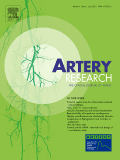
Artery Research
Advancing vascular knowledge for a healthier tomorrow.Artery Research is an esteemed open access journal published by BMC in the United Kingdom, dedicated to advancing the field of vascular biology and cardiovascular medicine. Since its inception in 2006 and transitioning to an open access format in 2019, the journal has become a pivotal platform for disseminating high-quality research on arterial health, pathology, and the latest clinical advancements. With an impactful focus on anatomy, cardiology, and physiology, Artery Research holds a notable reputation within the global research community, ranked in the Q3 and Q4 category quartiles in its respective fields and reflected in its Scopus ranks. The journal aims to foster collaborations and discussions among researchers and practitioners by providing an accessible avenue for publishing pivotal findings and insights. As it continues to evolve through 2024 and beyond, Artery Research remains committed to enriching cardiovascular research and driving innovations toward better health outcomes.

Nature Cardiovascular Research
Transforming research into impactful cardiovascular solutions.Nature Cardiovascular Research, published by SpringerNature in Germany, stands as a premier journal dedicated to advancing the field of cardiovascular sciences. With an impressive 2023 categorization in the Q1 quartile across multiple disciplines—including Biochemistry, Genetics and Molecular Biology, Cardiology, and Medicine—this journal uniquely positions itself as a leading resource for pioneering research and innovative findings. Although currently not open access, it provides a rich repository of peer-reviewed articles that contribute directly to the evolving landscape of cardiovascular medicine. The journal aims to bridge the knowledge gap between basic science and clinical application, catering to researchers, healthcare professionals, and students alike who are immersed in the complexities of cardiovascular health. With robust Scopus rankings in key categories, Nature Cardiovascular Research is poised to shape future directions in the field, helping to foster a deeper understanding of cardiovascular diseases and their underlying mechanisms. Explore the latest research and be part of the conversation in one of the most impactful scientific domains.
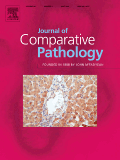
JOURNAL OF COMPARATIVE PATHOLOGY
Bridging Disciplines in Pathology and Forensic MedicineJOURNAL OF COMPARATIVE PATHOLOGY, published by Elsevier Science Ltd, stands as a significant publication within the fields of pathology and forensic medicine, as well as veterinary studies. With an ISSN of 0021-9975 and an E-ISSN of 1532-3129, this journal has been disseminating critical research since 1950, contributing to the advancement of knowledge through its focus on comparative pathology. The journal's reputable standing is underscored by its Q3 classification in Pathology and Forensic Medicine and Q2 in Veterinary (miscellaneous) for 2023, reflecting its vital role in shaping contemporary discourse in these domains. The Scopus ranks further solidify its presence, placing it at the 51st percentile in general veterinary sciences and the 32nd percentile in pathology—a testament to the quality and relevance of the contributions it publishes. Although it operates under a subscription model, the journal remains accessible to researchers and practitioners who aim to deepen their understanding of pathological phenomena across species, enhance diagnostic accuracy, and improve clinical practices. With a steadfast commitment to rigorous peer review and a global readership, the JOURNAL OF COMPARATIVE PATHOLOGY is an essential resource for those engaged in research and professional practice, fostering collaborations and innovations that bridge complementary areas of study.
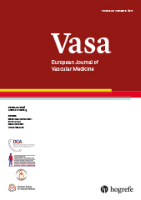
Vasa-European Journal of Vascular Medicine
Transforming Vascular Insights into Clinical ImpactVasa - European Journal of Vascular Medicine is a leading peer-reviewed journal dedicated to advancing the field of vascular medicine, published by HOGREFE AG in Switzerland. With a proud history dating back to 1972, this journal serves as a critical platform for researchers, clinicians, and healthcare professionals committed to enhancing knowledge and practice related to cardiovascular health and vascular disorders. Holding a notable Q2 ranking in the cardiology and cardiovascular medicine category, Vasa’s scholarly contributions reflect high-quality research and innovative insights that drive clinical applications. The journal provides essential access to original articles, reviews, and case studies, fostering a vibrant exchange of ideas within the vascular medicine community. Its Scopus rank of #159 out of 387 further underscores its impact, placing it confidently in the 59th percentile among its peers. Vasa is synonymous with rigorous academic standards and relevance, making it an invaluable resource for anyone seeking to stay at the forefront of vascular research and its clinical implications.

Cardiogenetics
Unlocking the secrets of genetics in cardiovascular medicine.Cardiogenetics, published by MDPI, is a leading open-access journal dedicated to advancing the field of genetics as it pertains to cardiovascular health and diseases. Since its launch in 2011, this journal has been at the forefront of disseminating high-quality research that explores the genetic underpinnings of cardiovascular conditions, offering a platform for innovative studies, reviews, and case reports. With an ISSN of 2035-8253 and an E-ISSN of 2035-8148, Cardiogenetics aims to bridge the gap between genetic research and clinical application, helping researchers, healthcare professionals, and students stay abreast of the latest advancements and findings. The journal’s commitment to open access ensures that its valuable content is available to a global audience, fostering greater collaboration and knowledge sharing in the cardiovascular genetics community. By contributing to this dynamic field, Cardiogenetics plays a crucial role in improving patient outcomes and paving the way for personalized medicine in cardiology.
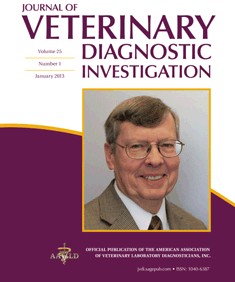
JOURNAL OF VETERINARY DIAGNOSTIC INVESTIGATION
Exploring the forefront of veterinary diagnostic methodologies.The JOURNAL OF VETERINARY DIAGNOSTIC INVESTIGATION, published by SAGE PUBLICATIONS INC, stands as a pivotal resource in the field of veterinary medicine, focusing on the latest advancements in diagnostic methodologies and their application in animal health. With an impressive impact factor and ranked in the Q1 category of Veterinary (miscellaneous) for 2023, this journal ensures the dissemination of high-quality research that is critical for veterinarians, researchers, and students alike. Established in 1989 and set to continue through 2024, it encompasses a broad spectrum of topics, vital for professionals committed to enhancing veterinary diagnostics. The journal's rigorous peer-review process guarantees that only the most innovative and thorough research contributions reach its audience, fostering an environment of academic excellence and knowledge transfer in the veterinary diagnostic field.

Malaysian Journal of Pathology
Fostering innovation in medical research and practice.Malaysian Journal of Pathology, published by the MALAYSIAN JOURNAL PATHOLOGY, stands as a pivotal resource in the fields of pathology and medicine, contributing rich insights since its inception in 1979. This peer-reviewed journal, based in Malaysia, is dedicated to disseminating original research, review articles, and case studies that advance the understanding of disease mechanisms and diagnostics. With a current impact factor reflecting its ranked positioning—Q4 in Cell Biology, Q4 in Histology, and Q3 in both Miscellaneous Medicine and Pathology & Forensic Medicine—this journal serves as an essential platform for researchers, clinicians, and students alike. Although it operates without open access, its scholarly rigor and contributions are well recognized, holding ranks such as #84 in Pathology and Forensic Medicine according to Scopus. The Malaysian Journal of Pathology is committed to fostering innovation and excellence in medical research, making it an invaluable tool for professionals seeking to stay abreast of significant advancements in the pathology domain.

Arquivos Brasileiros de Cardiologia
Connecting the global cardiology community through innovative research.Arquivos Brasileiros de Cardiologia is a leading open-access journal dedicated to advancing the field of cardiology and cardiovascular medicine. Established in 1950 and published by the ARQUIVOS BRASILEIROS CARDIOLOGIA, this Brazilian journal plays a crucial role in disseminating high-quality research that addresses both emerging and established topics in cardiovascular science. With an impressive history and a commitment to open access since 1997, it provides researchers, healthcare professionals, and students with free and readily available content that significantly contributes to the understanding and management of cardiovascular diseases. The journal is indexed in Scopus and holds a Q3 ranking in the category of Cardiology and Cardiovascular Medicine, demonstrating its relevance and participation within the global research community. Researchers can submit their work and access a wealth of information that spans a variety of subfields, reflecting the journal’s dedication to fostering innovation and collaboration within cardiology. With a mailing address at Avenida Marechal Câmara, 160-330 Centro, Rio de Janeiro, RJ 20,020-907, Brazil, the journal continues to serve as a vital platform for scholarly communication and knowledge exchange in the cardiovascular realm.